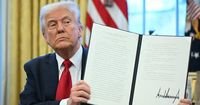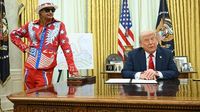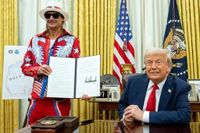On March 31, 2025, President Donald Trump took a significant step towards reforming the U.S. live entertainment ticketing industry by signing an executive order aimed at combating exploitative ticket scalping. The signing took place in the Oval Office, with rock star Kid Rock by his side, marking a notable collaboration between politics and the music industry.
The executive order directs the Federal Trade Commission (FTC) and the Department of Justice to rigorously enforce existing laws to protect consumers and ensure fair ticket pricing. Trump emphasized the importance of this issue, stating that he learned about the extent of ticket scalping from Kid Rock, who has been advocating for change in the industry for two decades. "You’ve been trying to get this done for 20 years or something; he said ‘Trump got it done in two weeks,’" Trump remarked during the signing ceremony.
Kid Rock, whose real name is Robert James Ritchie, expressed his concerns about scalpers who use bots to purchase large quantities of tickets at face value, only to resell them at exorbitant prices. "I want the fans to have fair ticket prices," he stated, underscoring the need for legislation that could eventually cap ticket prices on the resale market.
The executive order has garnered support from various industry organizations, including Live Nation and the National Consumers League. Live Nation, a major player in the ticketing industry, issued a statement thanking Trump for his efforts to address the issue of scalping and bots, which they claim prevent fans from accessing tickets at the prices set by artists. "Scalpers and bots prevent fans from getting tickets at the prices artists set, and we thank President Trump for taking them head-on," the company stated.
In a separate comment, Live Nation CEO Michael Rapino took to social media to express his gratitude, saying, "Big thank you to President Donald Trump for taking ticket scalping head-on which protects American consumers and artists." He also highlighted the need for meaningful resale reforms, including more enforcement of the BOTS Act and potential caps on resale prices.
This executive order is not Trump's first foray into ticketing issues. His predecessor, President Joe Biden, had already tasked the FTC with cracking down on "junk fees" in the ticketing industry. Under Biden, the Justice Department had initiated a lawsuit against Ticketmaster and its parent company, Live Nation, for allegedly monopolizing the live concert market, which has raised concerns among artists and fans alike.
Kid Rock, who has been vocal about his support for Trump, acknowledged the challenges faced by artists and fans alike when it comes to ticket pricing. "It’s kind of ridiculous. I would rather be a hero to working-class people and have them be able to come attend my shows and give them a fair ticket price," he said. His sentiments reflect a broader frustration within the entertainment community regarding ticket pricing practices that often leave fans feeling exploited.
The White House fact sheet accompanying the executive order specifically highlights the issue of bots, stating, "Ticket scalpers use bots and other unfair means to acquire large quantities of face-value tickets, then resell them at an enormous markup on the secondary market, price-gouging consumers and depriving fans of the opportunity to see their favorite artists without incurring extraordinary expenses." This acknowledgment of the problem is a crucial step in addressing the concerns of both artists and fans.
In light of the executive order, Live Nation's stock experienced a noticeable decline, reflecting the market's reaction to the impending regulatory changes. Reports indicated that call volume for Live Nation shares dropped significantly as news of the executive order spread, suggesting that investors are wary of the potential impact of increased regulation on the ticketing industry.
Despite the challenges, industry experts believe that the executive order could lead to meaningful changes in how tickets are sold and resold. The live entertainment sector is a massive industry, valued at approximately $132.6 billion and supporting nearly a million jobs across the country. As such, any reforms that promote transparency and fairness in ticket pricing could have far-reaching implications for both consumers and artists.
Senators have previously criticized Live Nation for its lack of transparency and its failure to adequately block bot purchases of tickets, especially following a highly publicized fiasco involving ticket sales for Taylor Swift's concert tour. Experts estimate that Ticketmaster holds over 70 percent of the market share for primary ticket services in major U.S. concert venues, raising concerns about monopolistic practices that could further harm consumers.
As the industry awaits the implementation of the executive order, many are hopeful that it will pave the way for a more equitable ticketing landscape. The call for caps on resale prices and stricter enforcement of existing laws may finally give fans a fighting chance to purchase tickets at reasonable prices, allowing them to enjoy live performances without the burden of exorbitant costs.
In a lighter moment, Trump revealed that Kid Rock was instrumental in persuading him to have dinner with comedian Bill Maher, a move that surprised many given Maher's history of critiquing Trump. Kid Rock's influence in this context highlights the unique relationships that can form between artists and political figures, further blurring the lines between entertainment and governance.
As the live entertainment industry continues to navigate the challenges posed by scalpers and bots, the hope is that the executive order signed by Trump will serve as a catalyst for meaningful change, benefiting both artists and fans alike.




